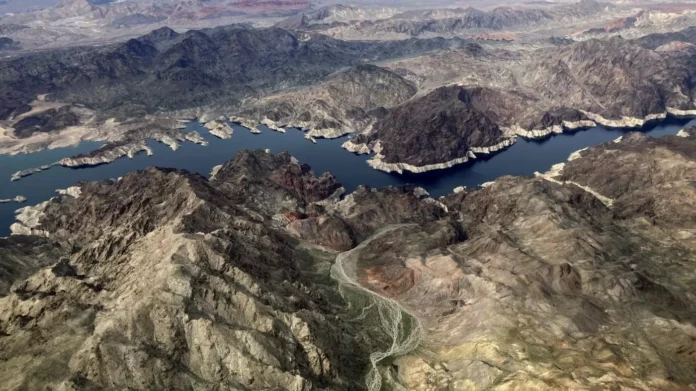Arizona, Nevada, and Mexico have once again been dealt the unfortunate news of substantial cuts to their Colorado River water allocations. This is the third consecutive year that these states and their neighboring country will have to contend with reduced water supplies, as announced by the Bureau of Reclamation in their August 2025 24-month study.
The Bureau of Reclamation is responsible for managing water resources in the Colorado River Basin, and their latest study provides an outlook on the hydrological conditions and projected operations for the basin’s two largest reservoirs: Lake Powell and Lake Mead. These reservoirs play a crucial role in providing water for millions of people and sustaining agriculture in the region.
The decision to cut water allocations for Arizona, Nevada, and Mexico is a result of consistently low levels in the Colorado River Basin. The basin has been experiencing a severe drought for over two decades, causing water levels to decline significantly. This year, the Bureau of Reclamation predicts that the water levels at Lake Mead will reach a record low of just 30% of its capacity.
With such dire conditions, it is not surprising that the Bureau of Reclamation had to make this difficult decision. As the water levels continue to decrease, it becomes more challenging to meet the water demands of the states and Mexico that rely on the Colorado River. This reality highlights the urgent need for sustainable water management in the region.
The impact of these cuts will be felt by all who depend on the Colorado River for their water needs. Agriculture, a vital industry in this region, will face significant challenges as farmers will have to make do with less water for their crops. This could lead to reduced yields and, in turn, affect the food supply chain. Similarly, businesses that rely on the tourism industry, such as fishing and boating, will also be impacted by the cuts.
However, despite this setback, there is a silver lining. These cuts are a wake-up call for all those involved in managing water resources in the Colorado River Basin. It is a call to action to work towards sustainable solutions that will ensure the long-term stability of the region’s water supply. The Bureau of Reclamation is already taking steps to address the situation by implementing measures to conserve water in the basin. But more needs to be done, and it requires a collective effort from all stakeholders.
One of the key ways to mitigate the impact of these cuts is through water conservation. The states and Mexico must continue to implement and enforce water conservation measures to reduce their water usage. This could include implementing drought-resistant irrigation methods, using recycled water, and promoting the use of drought-tolerant crops.
Another solution is to invest in infrastructure projects that will increase water storage capacity in the region. This could include building new reservoirs, expanding existing ones, and investing in underground water storage systems. These projects can help to capture and store more water during times of abundance, providing a buffer during periods of drought.
Furthermore, it is essential to address the root cause of this issue – climate change. The Bureau of Reclamation’s study highlights the impact of climate change on the Colorado River Basin and the urgent need for action. It is time for all stakeholders to come together and work towards reducing our carbon footprint and mitigating the effects of climate change.
It is undeniable that the news of these cuts is disheartening, but it should not discourage us from finding solutions. Instead, it should serve as a reminder of the importance of responsible and sustainable water management. By working together and implementing long-term solutions, we can ensure a stable water supply for future generations.
In conclusion, the Bureau of Reclamation’s announcement of substantial cuts to water allocations for Arizona, Nevada, and Mexico is a sobering reminder of the impact of climate change. It is a call to action for all stakeholders to come together and work towards sustainable solutions that will secure the region’s water supply. Let us use this opportunity to learn, adapt, and make a positive impact on the future of the Colorado River Basin.

